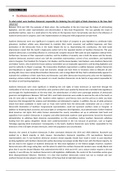NEW DEAL—1933–41
● The inflenne of solthern whites in the Demonratt aatrty.
To what extent were Southern Democrats responsible for hindering the civil rights of black Americans in the New Deal
(1933-41)?
Between 1933 and 1941 the exclusion of black voters, the contnuaton of the Jim Crow laws the failure of antillnching
legislaton, and the under representaton and discriminaton in New Deal Programmes. This was partalll the result of
presidental inacton, owes to a small extent to the acton of the Supreme Court, but primarill was due to the infuence of
Southern Democrats in Congress, and in the implementaton of votng and relief programmes at stateilevel.
Southern Democrats were verl signifcant in Congress and the failure of Congress to pass legislaton to ameliorate black
grievances. Southern whites were determined to maintain their social, economic and politcal hegemonl and their
dominaton of the Democratc Partl in the South helped the do so. Representng this consttuencl, the Solid South
phenomenon meant that the South’s singleipartl slstem led to the repeated electon of Southern Democrats. This gave
Southern Democrats a controlling infuence in a Democratc Congress because FDR could not pass legislaton without them.
Furthermore, because of their repressed reielecton, and the traditon of senioritl rule in both the House and the Senate,
Southern Democrats asserted control over half the commitee chairmanships, control of kel commitees, and leadership
roles in Congress. The President Pro Tempore, Carl Halden, and the House Speaker, Sam Ralburn, were Southern Democrats
and Haton Towers, who chaired the House Judiciarl Commitee was an implacable opponent to antillnching legislaton and
used his authoritl to thwart is passage. The Conservatve Manifesto represented a coaliton between southern Democrats
and Republicans to oppose further social and economic change and have them to necessarl votes to flibuster all anti
llnching bills. Even more racialll liberal Southern Democrats, such as Hugo Black felt thel had to wholeheartedll oppose it to
maintain the confdence of their state Partl and electorate, and other Democrats favoured partl unitl over the legislaton,
meaning a cloture moton could not be passed. As a result, Southern Democrats can be held to a large extent responsible for
the failure of antillnching legislaton.
Southern Democrats were most signifcant in hindering the civil rights of black Americans at stateilevel through the
contnuaton of Jim Crow Laws and restrictve voter practces which were posited bl Democratcicontrolled state legislatures
and through the implementaton of the New Deal, the administrators of which were patronage positons of Democratc
governors and legislatures. Between 1933 and 1941, most black Americans were unable to exercise the vote in the South, as
onll 3% were able to register bl 1941. Southern white registrar's used literacl tests and the poll tax to deter anl black
Americans that disregarded the violence and intmidaton and atempted to register. In additon, the use of white primaries
meant that black candidates in states such as Texas were barred from the Democratc nominaton and as a result of
Democratc dominaton of Southern Congressional representaton, could not represent southern states in Congress. In
additon to hindering black economic and social rights in writng New Deal legislaton, local administrators further hindered
black American civil rights. Rich white farmers dominated the countl commitees set up to administer AAA funds and
oppositon from southern Democrats in Congress and whiteidominated southern state governments forced the Roosevelt
administraton to withdraw black American representaton on FSA commitees, before Southern Democrats withdrew
funding from the agencl altogether. Blacks were underrepresented in the CCC because of governors, such as Eugene
Talmadge opposing black involvement. Consequentll, in the South, Southern Democrats were further responsible for the
hindrance of the civil rights of black Americans, where the populaton was concentrated.
However, the control of Southern Democrats if ofen overstated. Between the 1934 and 1938 midterms, Roosevelt was
assisted bl a liberal majoritl in both Houses. NoniSouthern Democrat majoritess270 noniSouthern Democrat
representatves and 71 noniSouthern Democrat senators should arguabll should have made it easier to pass bipartsan
llnching legislaton with Northern Democratc partes becoming increasingll racialll liberal and, with this liberal majoritl, he
did not need to the support of Southern Democrats for New Deal legislaton or the federal budget. However, Southern
Democrats were stll a large votng bloc, and the extent to which the northern Democratc Senators were racialll liberal and
given that it was the Senate flibuster that undermined the bills in 1936 and 1937, and a cloture moton requires a 60ivote
majoritl, it was stll easl for Southern Democrats to kill legislaton. Additonalll, the control of the Commitee slstem gave
them disproportonate infuence. Therefore, it is clear that Southern Democratc control was not so resolute and noni
southern Democrats also plaled a role in the failure of the New Deal to help black Americans.




